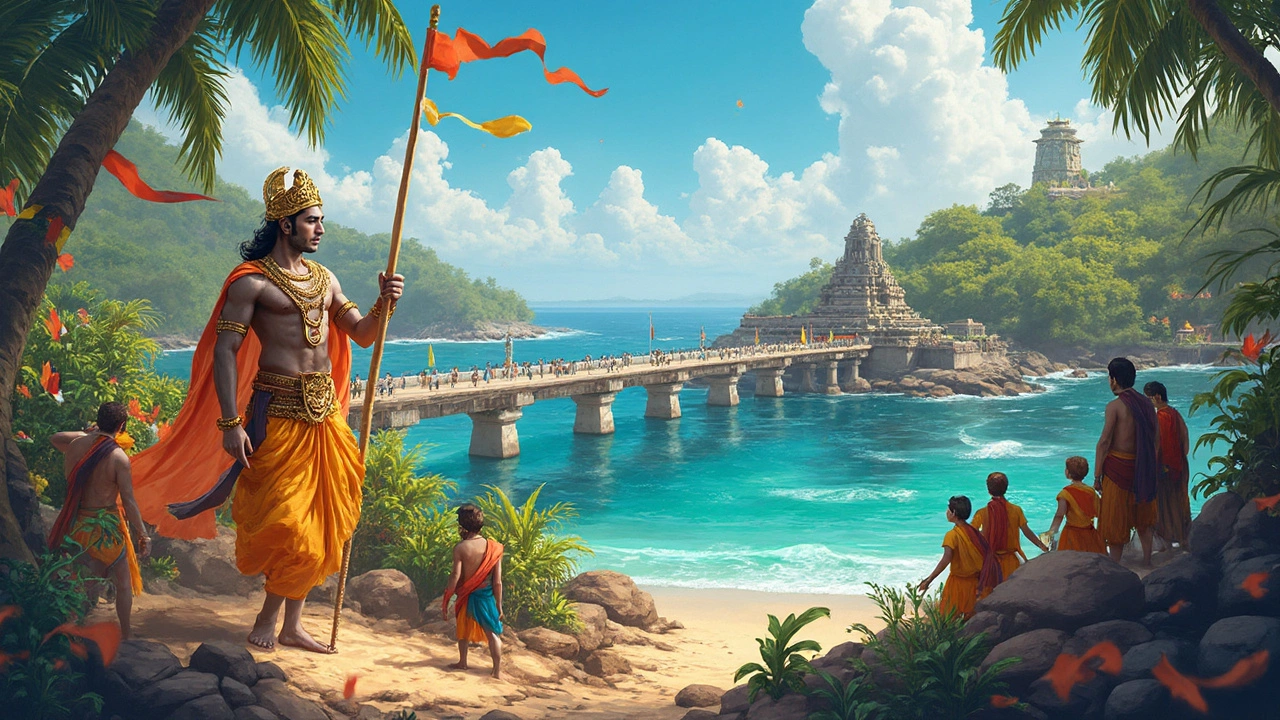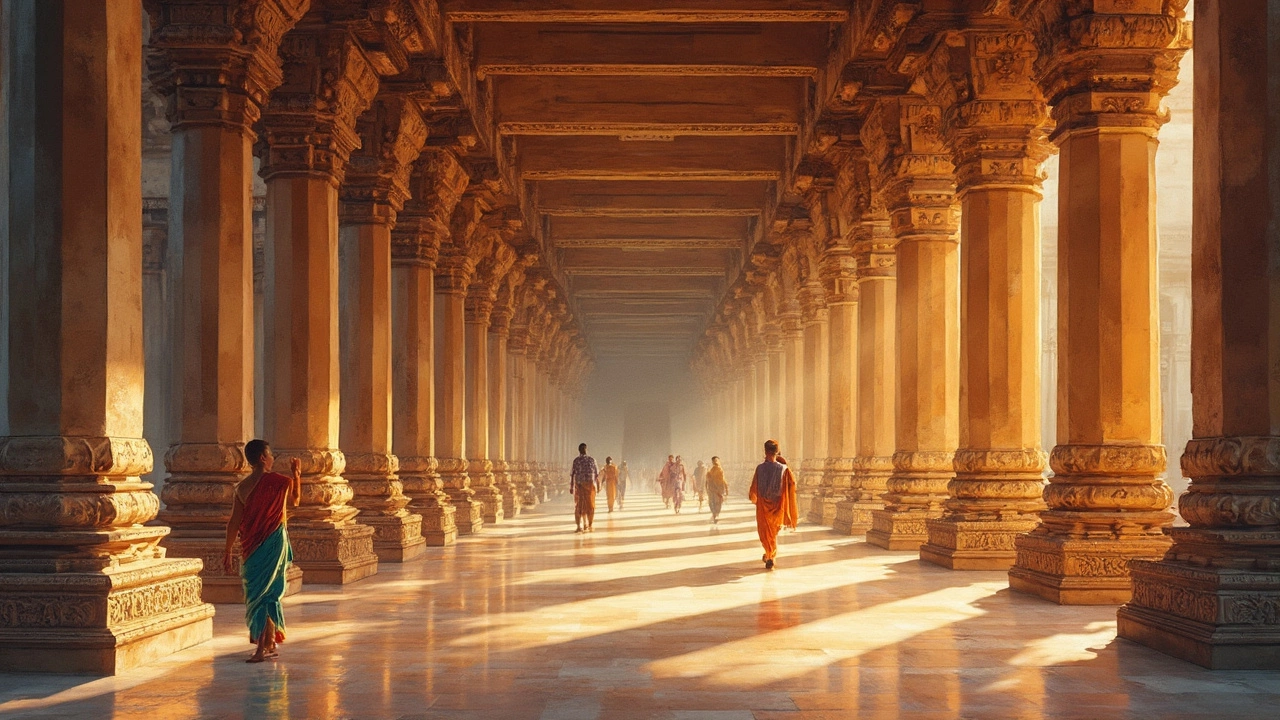Ever thought about why Rameswaram holds such a special place in Indian culture and religion? Well, for starters, it's not just another destination on the map. This town is steeped in mythology, tracing vivid stories linked to Lord Rama’s journey in the Ramayana. Located on Pamban Island, it’s a beacon for thousands of pilgrims eager to explore its ancient allure.
One of the standout features of Rameswaram is the Ramanathaswamy Temple. Known for its architectural grandeur, this temple boasts the longest temple corridor in the world. Imagine walking through those pillared corridors, feeling the past echo around you. It's not just about spirituality; it’s about soaking up history and culture.
- Importance of Rameswaram in Indian Mythology
- Architectural Marvels: The Temples
- Unique Experiences in Rameswaram
- Best Time to Visit and Travel Tips
- What to Eat and Where to Stay
Importance of Rameswaram in Indian Mythology
Rameswaram isn't just a pretty coastal town; it's deeply woven into the mythology that shapes India's cultural tapestry. Known as a crucial point in the epic Ramayana, Rameswaram is where Lord Rama, an avatar of Vishnu, built a bridge across the sea to reach Lanka, which is present-day Sri Lanka, to rescue his wife Sita from the demon king Ravana. This bridge, called 'Rama Setu' or 'Adam's Bridge,' is said to be a miraculous engineering feat executed by an army of monkeys and bears led by Lord Hanuman.
One of the noteworthy spots here is the Agnitheertham, a place of religious sanctity where pilgrims take a holy dip in the sea. It's believed that a bath here absolves one of sins. Just nearby is the Gandhamadhana Parvatham, the highest point on the island, which offers panoramic views of the surroundings and has footprints considered to be of Lord Rama.
Rameswaram, part of the sacred Char Dham Yatra, holds immense spiritual significance and attracts devotees from far and wide who seek divine blessings. The Ramanathaswamy Temple in Rameswaram is one of the twelve Jyotirlingas, which are sacred abodes of Shiva, adding another layer of spiritual importance to this town.
Rama's Legacy
The story goes that after defeating Ravana, Lord Rama wanted to absolve himself of any sin accrued during the war. He decided to worship Shiva and offer prayers at the site now known as the Ramanathaswamy Temple. The deity here, made of sand by Sita herself, commemorates this divine interaction between gods.
This intertwining of legend and geography makes Rameswaram a pivotal point of interest for both spiritual seekers and history enthusiasts, making it more than just a place of worship.
Architectural Marvels: The Temples
Step into Rameswaram and you're stepping into a world of architectural wonder. The standout gem is the Ramanathaswamy Temple, a place that’s as much a masterpiece of design as it is a spiritual haven. It's famous for its intricate stone screens and the sheer number of pillars - over a thousand, each telling a story of its own. These pillars aren't just there for show; they form the world's longest temple corridor, stretching up to 4,000 feet.
The Magnificent Ramanathaswamy Temple
The temple isn’t merely about size. What captivates visitors is how every inch brims with finely carved sculptures and breathtaking artwork. The gopurams (towers) pierce the sky, while the remarkably carved ceilings keep your eyes glued upwards. Legend goes that the Ramanathaswamy Temple holds one of the twelve Jyotirlingas of Lord Shiva, making it sacred for devout pilgrims.
The Mythical Agni Theertham
A short distance from the temple is Agni Theertham, a beachfront where pilgrims perform rituals before entering the temple. It's believed that a dip here cleanses one's sins. Visiting during sunrise is simply magical, with the golden rays casting reflections on the serene waters.
Exploring Beyond the Main Temple
Rameswaram isn't just a one-temple town. Other temples deserve a visit too, like the Kothandaramaswamy Temple, famous for its serene backdrop and historical tales of Lord Rama and Vibhishana. The Jada Tirtham, a quaint spot where Lord Rama is said to have washed his hair, is surrounded by lush greenery, offering a peaceful retreat.
| Temple | Feature | Specialty |
|---|---|---|
| Ramanathaswamy Temple | Longest Corridor | Over 1,200 Pillars |
| Kothandaramaswamy Temple | Historical Significance | Lord Rama and Vibhishana |
| Jada Tirtham | Natural Beauty | Greenery and Serenity |
Whether you’re an architecture buff, a history lover, or a spiritual seeker, Rameswaram offers a temple experience not to be missed. Each temple carries its own charm and tells tales as old as time.

Unique Experiences in Rameswaram
When you hear about Rameswaram, the first thing that probably comes to mind is pilgrimage. But there's so much more to uncover in this fascinating town beyond its spiritual vibes. Whether you're an introspective traveler or someone looking to soak up local color, Rameswaram has a blend of experiences that won't disappoint.
Visit the Mysterious Dhanushkodi
Straddling between mythical and tangible, Dhanushkodi is a ghost town with a captivating history. Following a devastating cyclone in 1964, the town remains eerily deserted. Walking down its sandy stretch, it's easy to wonder what life was like before nature took its course. And let’s not forget the views! You'll be treated to endless horizons where the Bay of Bengal and Indian Ocean meet.
Explore the Floating Stone Mysteries
Another draw is the so-called 'floating stones' tied to the epic of Ramayana. Believed to be part of the bridge built by Lord Rama to Lanka, these stones seem to defy natural laws by floating in water. It's strange, it's compelling, and definitely worth seeing through your own eyes. As Professor A. K. Sharma, a noted historian, once said,
"Rameswaram challenges the line between myth and reality, leaving explorers questioning what they once deemed impossible."
Discover the Marine Wonders
For those who fancy getting wet, Rameswaram offers some killer diving spots. Dive into the Palk Strait and explore vibrant coral reefs teeming with marine life. It's a visual feast that's got divers buzzing with excitement. If diving isn’t your thing, snorkeling is a good alternative and promises a peek into the underwater world without the hefty gear.
Witness Traditional Crafts at Kalam Sea Shell Mart
Art lovers can head over to the Kalam Sea Shell Mart. Here, you’ll find art pieces crafted from sea shells that make for unique souvenirs. It's a reminder of the town's connection to the sea and showcases the craftsmanship that defines Rameswaram’s artisan scene.
From telling tales of the past to offering unique experiences today, Rameswaram is far from a one-trick pony. It’s a vibrant tapestry of culture, nature, and mystery all wrapped into one irresistible package.
Best Time to Visit and Travel Tips
Choosing the right time to visit Rameswaram can make or break your trip. Trust me, you don’t want to be stuck under the scorching sun when you should be marveling at the temples or strolling the pristine beaches. So, when's the best time? The months from October to March are ideal when the weather is pleasant and cool compared to the rest of the year.
Planning a trip isn’t just about picking the right season. It’s also crucial to consider some travel tips. Public transportation is reliable, with trains and buses running smoothly to Rameswaram. However, having a car can give you the flexibility to explore the island at your pace, especially if you're planning to visit places off the beaten path.
Local Transport and Accommodation
If you’re relying on local transport, auto-rickshaws are your best bet for short distances. They're cheap and convenient. As for staying, there are plenty of options, from budget guesthouses to luxurious hotels that cater to all kinds of travelers. It’s advisable to book your accommodation in advance if you're visiting during peak season.
“Visiting Rameswaram was like stepping into a living history book,” says travel writer Priya Nair. “The best time to experience its rich culture and religious significance is during the cooler months, which adds an extra comfort layer to the journey.”
What to Pack
- Light, breathable clothing
- Sunscreen and hats for sunny days
- A reusable water bottle—stay hydrated!
- Comfortable shoes for walking around temple sites
Don't forget your spiritual side. Whether or not you're religious, Rameswaram's tranquility has a unique way of touching every visitor. Soak in the Rameswaram vibe and let it enrich your travel tales!

What to Eat and Where to Stay
Food in Rameswaram is a delightful journey in itself. Picture this: you start your day with a plate of authentic south Indian breakfast. Local eateries serve hot, crispy dosas and comforting idlis, paired with coconut chutney and sambar. Look for places like Sri Murugan Mess or Ganesh Mess for that homely taste.
Local Delicacies
Don't miss out on trying the seafood here. Being close to the coast, Rameswaram offers fresh and flavorful seafood dishes. Prawns and fish curry are must-haves. If you fancy something a bit more local, try ‘kootu’, a hearty vegetable stew, which hits the spot every time.
Popular Eats
- SriSivaAyyanar Mess: Known for its authentic flavors.
- Hotel Guru: Famous for its mixed seafood platter.
- ShriArunachala: Perfect spot for vegetarian delights.
Now, where to stay? Accommodation ranges from budget lodgings to more comfortable stays. You won’t have trouble finding a place that fits your pocket.
Accommodation Options
- Daiwik Hotel: A well-known four-star option that combines comfort and convenience.
- Hotel SS Grand: Offers mid-range pricing with great amenities.
- Vinayaga by Poppys: For those traveling on a budget, this place provides all the essentials without breaking the bank.
These choices come highly recommended by past travelers and offer easy access to the main attractions. Book in advance during peak seasons for the best deals.
Traveling to Rameswaram isn’t just about the temples and sights, but also indulging in the local culture, including the food and accommodations that make your stay memorable.
